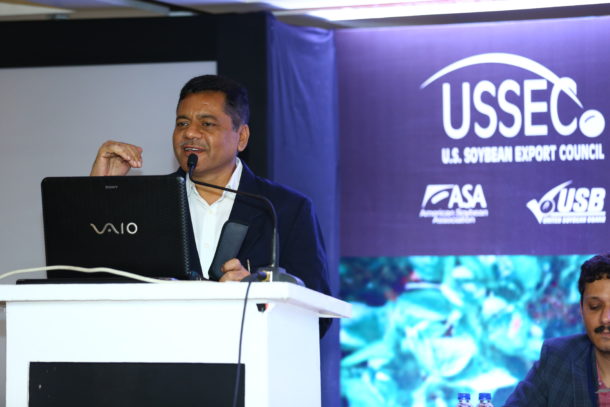Mumbai, 2nd July 2018 : In order to encourage soy food processing, Conference on the “Entrepreneurship Development in Soy Food Processing” was held at Mumbai. This program was organised by the US Soybean Export Council (USSEC) jointly with the Association of Food Scientist and Technologists (AFST) and involving various stakeholders from the industry, government, academia, agri. Policy experts, US department of Agriculture (USDA), Food Safety and Standards Authority of India (FSSAI), Solvent Extractors Association of India (SEAI) and the financial institutions etc.

Mr. P Muthumaran, Director FSSAI for the Western and Southern Region was the chief guest on the occasion.
Speaking on the soy food business potential in India and the role soy can play in health and nutritional security of India, Dr. Ratan Sharma of the USSEC stated that Soybean is one of the very few plants those provide a high quality protein with minimum saturated fat. Soybean helps people feel better and live longer with an enhanced quality of life. Soybeans contain all the three macronutrients required for good nutrition, as well as fiber, vitamins, minerals. Soybean protein provides all the essential amino acids in the amounts needed for human health. Protein in just 250 grams of soy bean is equivalent to protein in 3 liters of milk or 1 kg of mutton or 24 no’s of eggs. In addition to being a rich source of nutrients, soybean has a number of phytochemicals (isoflavones), which offer health benefits along with soy protein. Soy protein and isoflavones together contribute to a number of health benefits such as, cancer prevention, cholesterol reduction, keeping heart healthy, combating osteoporosis and menopause regulation. Being low in glycaemic index soy plays a very important role in maintaining the low sugar levels in diabetics.
Dr. Sharma further explained about the nutritional quality of the soy oil from USA. Besides the regular nutritious soy oil US has developed high oleic soy oil. High oleic soy oil is being very popular as industry preferred substitute for partially hydrogenated vegetable oils and are used in all manners of processed foods especially the snack foods for deep frying. High oleic soy oil is free from trans fats as well as lower in saturated fat and contains three times more of beneficial monounsaturated fatty acid compared to conventional soy oil.
As per Dr. sharma US Food and Drug Administration FDA approved Bunge North America’s petition for a qualified health claim linking soybean oil consumption to reduced risk of heart disease. Soybean oil is the US’ most commonly used ingredient and top dietary source of polyunsaturated fats. Soy oil is the second largest edible oil used in India. Soybean oil is considered heart-healthy oil as it’s cholesterol-free and low in saturated fatty acids – it contains 61 % poly-unsaturated fatty acids. Two fat components essential for health and wellbeing, linoleic and linolenic acids, are also found in the right proportions in soybean oil. It is also a good source of vitamin E. Like fish oils, soybean oil contains omega-3, known to be protective against heart disease and cancer. He told that US soy oil is known for its nutritional superiority in comparison with the soy oils from other origins.
Discussing about the Soy food business opportunities in India Dr. Sharma very clearly mentioned that raw material plays a major role to produce a quality product delivering proper nutrients and making a tasty product. Food specialty soybeans are not grown in India limiting the growth of soy food sector in lack of desired quality product with limited value addition possibilities. Dr. Sharma highly recommended the food specialty soybeans from USA which produces an excellent quality soy food with much better acceptability of the end product and excellent value addition possibility when compare with the Indian soybeans.
Mr. Adam Branson the senior Agri. Attaché of Agriculture Affairs at the Foreign Agriculture Services, USDA of the United States Consulate general at Mumbai explained that a huge opportunity exists for the agriculture products trade between India and the United States. Adam stated that Agriculture is one of the top economies of the US and we look forward India as a great partner to us for the agri. business and the related trade. Adam further discussed about the bilateral trade relations between US and India, environmentally sustainable production of soybeans, about agri. commodities and other areas of US agriculture and agri. Products where both the countries can work together.
Mr. G. Chandrasekhar, a senior agriculture policy and trade expert spoke about addressing the nutritional challenges and creating employment through soy food business. He replied the query on various aspects of the food and agriculture policies of the Indian government. Dr. Prabodh Halde, head regulatory affairs, Marico and president of AFST, India covered the regulatory norms on various food products, processing and labelling etc. Dr. BV Mehta talked about the supply and demand of the edible oils in India and he told that India has a great potential of using soybean oil. The consumption of soy oil is increasing because of its nutritional superiority to other edible oils. Mr. Indranil Chatterjee from the DuPont Nutrition presented about the protein rich foods and beverages made by using soy protein isolates and concentrates. Dr. Uday Annapure discussed about the scope and benefits of extrusion technology in the Indian food processing sector and about the phenomenal growth in this segment especially the soy nuggets (Soy Bari) which are very popular in India. Speaking on the nutritional and functional properties of the soybean oil Dr. Meena Mehta interpreted about the nutritional facts of the soybean oil and highlighted its nutritional and functional properties.
Some of the soy food start-ups shared their experience and the achievements in the soy food processing sector. Here it is very important to note that there are more than 2,000 soy food processing industries are there in India. This segment is growing at a rate of 12% on an annual basis.
Recently soy food processing has been immersed as a very good source of creating the employment opportunities on a small, medium and large scale. India is the fifth largest producer of soybeans but in lack of awareness on its nutrition and the proper processing technologies this product is not getting the acceptance in the Indian diet. Although the soy food processing sector is growing at a faster rate of 12% annually but still needs to develop with a pace to bridge the protein gap of the country and soy processing industries should be integrated to the nutrition intervention program for an easy access of the soy food products on local as well as regional level. This would be the best way to provide the low cost nutrition to the masses and creating employment opportunities through the soy food processing on small, medium and large scale.
This program was attended by a large number of people from the soy food industry, trade associations, nutrition professionals, scientists and professionals from the multinational companies from all over the country. The U.S. Soybean Export Council (USSEC) is a dynamic partnership of key stakeholders representing U.S. soybean producers, commodity shippers, merchandisers, allied agribusinesses and agricultural organizations. Through a global network of international offices and strong support in the U.S., USSEC provides trade and technical services as well as market access support in order to build a preference for U.S. soy and soybean products. Visit : www.ussec.org





